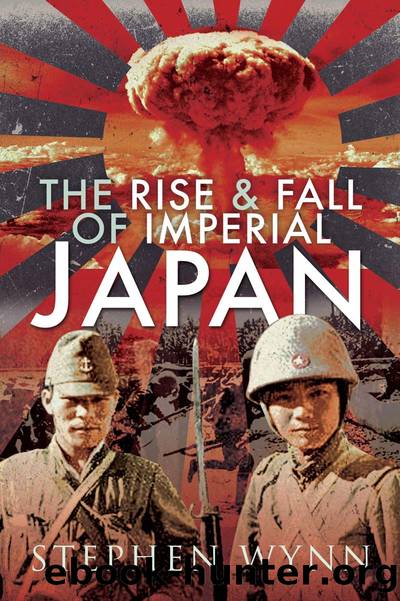The Rise and Fall of Imperial Japan by Stephen Wynn;

Author:Stephen Wynn;
Language: eng
Format: epub
Tags: HISTORY / Military / World War II
Publisher: Casemate Publishers & Book Distributors, LLC
Published: 2020-08-30T00:00:00+00:00
CHAPTER NINE
Emperor Hirohito
Emperor Hirohito was the spiritual leader of Japan although how much power he actually had is debateable. He was born on 29 April 1901 at the Togu Palace in Tokyo, the first son of Crown Prince Yoshihito who would later become the Emperor Taisho during the reign of his grandfather, Emperor Meiji. As a child he was known as Prince Michi. In keeping with the tradition of the day, seventy days after his birth he was sent to live with another family. Count Kawamura Sumiyoshi, a retired vice-admiral, brought him up as if he were his own child, as he also did with the Princeâs brother, Prince Yasuhito.
But when Prince Michi was 3, Kawamura died and he and his brother Yasuhito returned to live at the Imperial Court, initially at the Imperial mansion in Numazu, Shizuoka, and after that at the Aoyama Palace.
He was 11 when his grandfather, the Emperor Meiji, died on 30 July 1912, making him heir apparent to his father Yoshihito, the new Emperor. Now known as Hirohito, it was decided that the prince should begin his military service. He was commissioned as a Second Lieutenant in the Imperial Japanese Army and as an ensign in the navy. In 1914 he was promoted to the rank of lieutenant in the army and sub-lieutenant in the navy, and two years later he was promoted to captain in the army and lieutenant in the navy. In the same year, 1916, he was formally proclaimed Crown Prince and heir apparent, and in 1920 he received further military promotions, becoming a major in the army and a lieutenant commander in the navy.
In 1921, to enhance the good relations Japan had built up with her European allies, Hirohito was sent on a six month tour of Europe, visiting Belgium, France, Holland, Italy, and the United Kingdom.
On his return to Japan, his fatherâs health was on the decline and he was suffering bouts of mental illness, and on 29 November 1921 Hirohito was made the Regent of Japan. This was an interesting time politically, and one when he greatly needed the good council of his advisers.
He had only been Regent for two weeks when the Four Power Treaty on Insular Possessions was signed with Britain, France and the United States. The treaty was an agreement between the four nations to recognise the status quo in the Pacific region. Japan and Britain also agreed to formally terminate the Anglo-Japanese Alliance which had originally been signed on 30 January 1902.
The Washington Naval Agreement, also known as the Five Power Treaty, was signed in Washington on 6 February 1922 by France, Italy, Japan, the UK and the USA. Its purpose was to prevent an arms race by limiting each countryâs permitted naval construction.
Japan withdrew its troops from the Siberian Intervention on 28 August 1922. The Siberian Intervention had seen troops from the Entente Powers dispatched to assist White Russian forces against Soviet Russia and its allies during the Russian civil war.
On 27 December 1923,
Download
This site does not store any files on its server. We only index and link to content provided by other sites. Please contact the content providers to delete copyright contents if any and email us, we'll remove relevant links or contents immediately.
| Africa | Americas |
| Arctic & Antarctica | Asia |
| Australia & Oceania | Europe |
| Middle East | Russia |
| United States | World |
| Ancient Civilizations | Military |
| Historical Study & Educational Resources |
Magic and Divination in Early Islam by Emilie Savage-Smith;(1474)
Ambition and Desire: The Dangerous Life of Josephine Bonaparte by Kate Williams(1304)
Bohemians, Bootleggers, Flappers, and Swells: The Best of Early Vanity Fair by Bohemians Bootleggers Flappers & Swells- The Best of Early Vanity Fair (epub)(1285)
Papillon by Henry Charrière(1269)
Twelve Caesars by Mary Beard(1177)
Operation Vengeance: The Astonishing Aerial Ambush That Changed World War II by Dan Hampton(1116)
What Really Happened: The Death of Hitler by Robert J. Hutchinson(1098)
London in the Twentieth Century by Jerry White(1076)
Time of the Magicians by Wolfram Eilenberger(1051)
Twilight of the Gods by Ian W. Toll(1048)
The Japanese by Christopher Harding(1042)
Lenin: A Biography by Robert Service(1007)
The Devil You Know by Charles M. Blow(956)
Freemasons for Dummies by Hodapp Christopher;(898)
A Social History of the Media by Peter Burke & Peter Burke(888)
Napolean Hill Collection by Napoleon Hill(870)
Henry III by David Carpenter;(869)
The Churchill Complex by Ian Buruma(863)
The Rise and Triumph of the Modern Self by Unknown(860)
